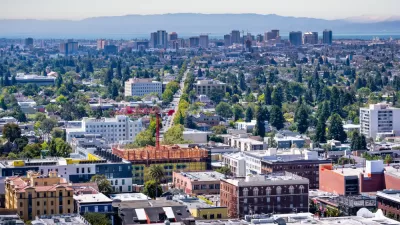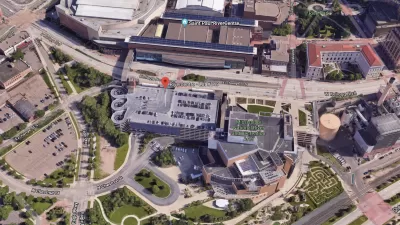Berkeley is the second city in Northern California to approve landmark zoning reforms so far in 2021.

The city of Berkeley, known for many decades as a hot bed of anti-development politics, last night undertook a major step in reforming its zoning code to create incentives for more residential development.
At a hearing that lasted into the evening, the Berkeley City Council approved an ordinance that eliminates parking requirements for residential properties citywide, with a few exceptions on hillside properties.
The City Council voted unanimously to approve the ordinance according to multiple sources in attendance at the hearing last night, including Councilmember Rigel Robinson. The vote marks a significant milestone for the city, which has a reputation for anti-development politics amidst sky-high real estate prices. A recent story about the "conservative" development politics in the city of San Francisco could very well have been written about the Berkeley of the relatively recent past, in addition to the more distant past. That reputation has begun to shift in more recent years, as new leadership has altered the development politics of the City Council. In 2019, the city decided to study zoning for new Missing Middle Housing, and the city was among the first to ban natural gas in new buildings.
An article by Patrick Siegman detailed the Berkeley parking reform ordinance before the City Council's vote. Siegman provides specific details about the ordinance, in addition to explaining the thinking behind parking requirement reform:
Reforms recommended by the Planning Commission would remove minimum parking requirements for all residential land uses, with the exception of some lots located on roadways less than 26 feet wide in hillside areas. The Planning Commission also recommends adopting maximum parking limits and instituting transportation demand management requirements for residential land uses.
The city of Berkeley's decision to eliminate parking requirements for residential properties follows just days after the city of Sacramento, located 90 miles to the northeast of Berkeley, approved landmark parking reforms while approving citywide zoning changes.
FULL STORY: Should Blind People in Berkeley Be Required to Buy Parking Spaces?

Planetizen Federal Action Tracker
A weekly monitor of how Trump’s orders and actions are impacting planners and planning in America.

Maui's Vacation Rental Debate Turns Ugly
Verbal attacks, misinformation campaigns and fistfights plague a high-stakes debate to convert thousands of vacation rentals into long-term housing.

San Francisco Suspends Traffic Calming Amidst Record Deaths
Citing “a challenging fiscal landscape,” the city will cease the program on the heels of 42 traffic deaths, including 24 pedestrians.

Defunct Pittsburgh Power Plant to Become Residential Tower
A decommissioned steam heat plant will be redeveloped into almost 100 affordable housing units.

Trump Prompts Restructuring of Transportation Research Board in “Unprecedented Overreach”
The TRB has eliminated more than half of its committees including those focused on climate, equity, and cities.

Amtrak Rolls Out New Orleans to Alabama “Mardi Gras” Train
The new service will operate morning and evening departures between Mobile and New Orleans.
Urban Design for Planners 1: Software Tools
This six-course series explores essential urban design concepts using open source software and equips planners with the tools they need to participate fully in the urban design process.
Planning for Universal Design
Learn the tools for implementing Universal Design in planning regulations.
Heyer Gruel & Associates PA
JM Goldson LLC
Custer County Colorado
City of Camden Redevelopment Agency
City of Astoria
Transportation Research & Education Center (TREC) at Portland State University
Jefferson Parish Government
Camden Redevelopment Agency
City of Claremont





























